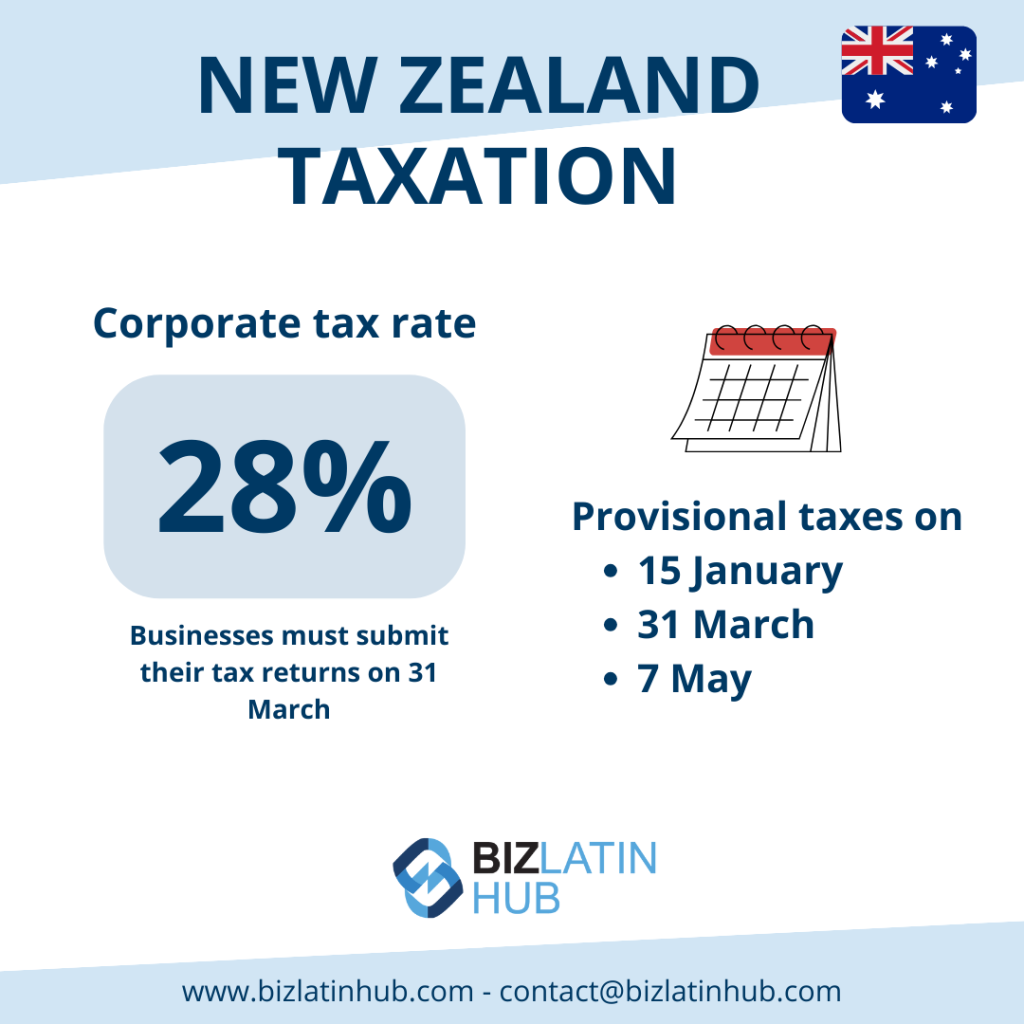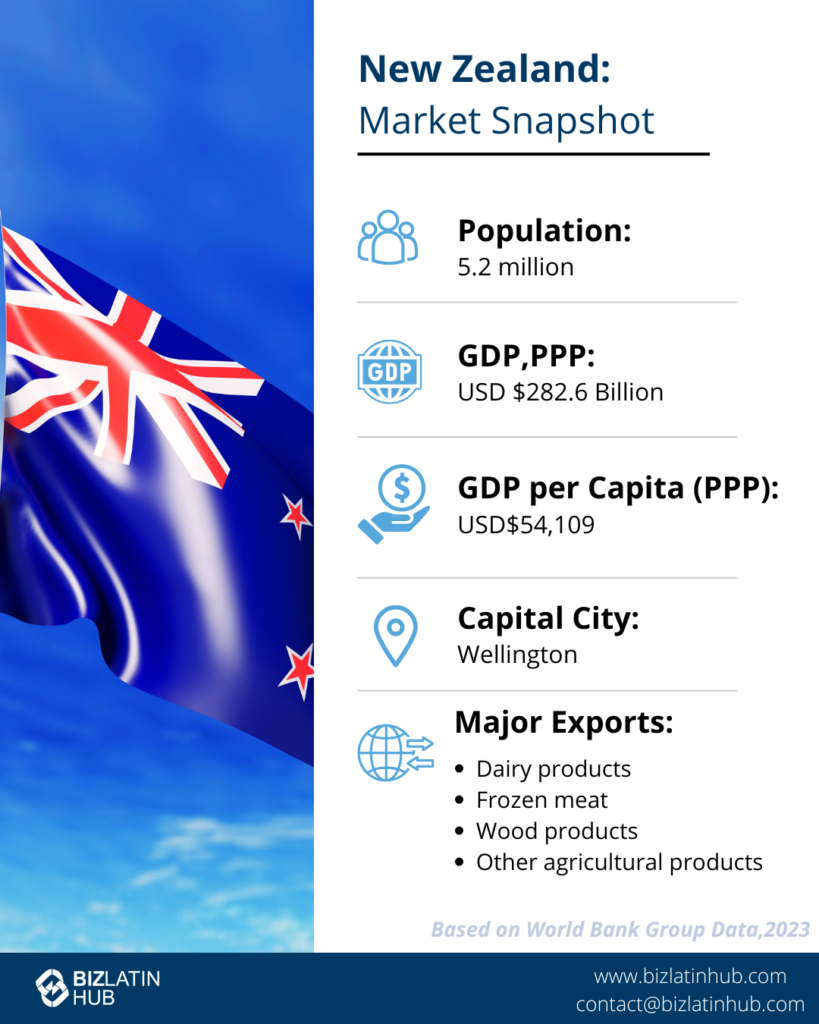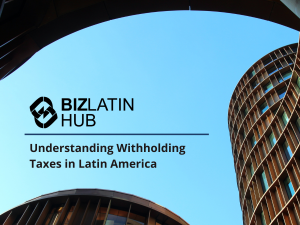Corporate accounting and taxation in New Zealand should be a vital part of your market entry strategy to register a company in New Zealand and ensure compliance with its detailed regulatory framework. This guide provides essential information to help you navigate New Zealand’s fiscal obligations effectively. Biz Latin Hub offers expert support in understanding New Zealand’s accounting standards. Our services extend globally through a broad network of offices in key markets.
Key Takeaways
| Accounting Standards in New Zealand | Annual Financial Statements Filing Annual Returns Income Tax Returns GST Returns PAYE and Payroll Reporting FBT Returns Audit and Assurance Requirements Record Keeping |
| Corporate Tax Rate in New Zealand | The current corporate tax rate in New Zealand is set at 28%. |
| New Zealand Value Added Tax Rate | Known as Goods and Services tax (GST) locally, this is set at 15%. |
| Dividend Tax Rate in New Zealand | Dividends are taxed at 33%. |
Overview of New Zealand’s Tax and Compliance System
All businesses that are resident in New Zealand must pay corporate tax on their income – both income that they make inside of New Zealand, and income they make around the world. That is why so many entrepreneurs choose to set up subsidiaries or branch offices in New Zealand to protect their overseas assets and pay tax only on New Zealand-sourced income.
The current corporate tax rate in New Zealand is 28%, and businesses must submit their tax returns on 31 March and pay provisional taxes on 15 January, 31 March, and 7 May. Earnings that are made by branch offices and subsidiaries are subject to the same 28% tax rate as other New Zealand businesses, but only on income that is generated in the country.
Look Through Companies (which allow the company to transfer income and expenditure to shareholders) do not pay corporate tax, although foreign entrepreneurs earning more than US$10,000 of foreign sourced income are no longer able to incorporate as an LTC in NZ. A New Zealand-registered company must have at least one director who lives in New Zealand (or Australia). A physical registered office is required for correspondence.
For companies that generate more than US$45,000 in sales, registering for the New Zealand Goods and Services Tax (GST) is a requirement by law, and returns must be filed every month to ensure compliance. Hiring an in-house bookkeeper makes the most sense, though you may choose to outsource your New Zealand accountancy to another firm.
Finally, it’s important to mention that New Zealand businesses are able to carry forward their losses indefinitely; should you be unprofitable in your first year, you can recoup these losses in the second year and therefore receive a reduced tax bill, allowing you to break even.
GST, Filing Frequency, and Taxable Supplies
GST-registered companies must submit returns through myIR, the government’s secure portal. Filing frequency is determined by annual turnover and GST volume. Key annual accounting obligations for companies in New Zealand include the following:
- Annual Financial Statements
- Companies must prepare financial statements that comply with the New Zealand equivalents to International Financial Reporting Standards (NZ IFRS), depending on their size and type. Smaller companies may qualify for simplified reporting standards.
- Filing Annual Returns
- All registered companies must file an annual return with the Companies Office, providing updated company details, including director and shareholder information. This filing is required every 12 months from the company’s incorporation date.
- Income Tax Returns
- Companies must file an annual income tax return (IR4) with Inland Revenue. This includes declaring income, expenses, and tax calculations for the financial year ending March 31.
- Goods and Services Tax (GST) Returns
- Companies registered for GST must submit periodic returns (monthly, bi-monthly, or six-monthly) to report GST collected and claimed.
- PAYE and Payroll Reporting
- Employers must file pay-as-you-earn (PAYE) and related payroll details with Inland Revenue, usually on a payday basis under the Payday Filing regime.
- Fringe Benefit Tax (FBT) Returns
- Companies providing fringe benefits to employees, such as company cars or subsidized loans, must calculate and report FBT quarterly or annually.
- Audit and Assurance Requirements
- Large companies, Public Interest Entities (PIEs), and certain subsidiaries of overseas entities may require annual audits. Small and medium-sized entities are generally exempt unless shareholders or the constitution mandate it.
- Record Keeping
- Companies must retain financial records for at least seven years, including invoices, bank statements, and ledgers.
Corporate Tax and Dividend Withholding Rules
As a foreign investor entering into New Zealand to add a new revenue stream to your bow, it is important that you get to grips with the incorporation process and local taxation to ensure you can operate a profitable venture in the country. First off, foreign companies in New Zealand are subject to corporate income tax laws if a majority of their shareholders are based in New Zealand (50%+).

Transactions that take place between New Zealand companies or branches are subject to transfer pricing regulations, such as transfer pricing adjustments and determining the cost of cross-border supplies in an effort to build a fair and competitive market. It is critical that you remain fully compliant with local business laws to avoid investigations, fines, or prosecution.
For companies paying dividends to non-residents, New Zealand applies a standard withholding tax rate of 33%. However, this rate can be reduced under specific circumstances—for example, if your company pays tax on its earnings, if your parent company holds at least 10% of the firm’s share capital, or if you’re operating from a country with a double taxation agreement. To ensure you benefit from these reductions and remain compliant, it’s advisable to work with a reputable New Zealand accountant.
In addition to dividends, withholding taxes also apply to royalties and interest paid to non-residents by companies registered in New Zealand. The standard withholding tax rate for these payments is 15%. However, this rate can similarly be reduced under New Zealand’s extensive network of double taxation treaties. Maintaining accurate financial records and consulting with a professional accountant can help businesses minimize tax obligations when distributing profits to non-residents or transferring assets and earnings back to their home countries for personal or business purposes.
New Zealand has entered into numerous double taxation avoidance agreements (DTAAs) with other countries, which help prevent double taxation and encourage cross-border trade and investment. These treaties often allow for reduced withholding tax rates or exemptions, depending on the nature of the transaction. Additionally, New Zealand has tax information exchange agreements with various jurisdictions. Businesses operating internationally should familiarize themselves with these treaties and agreements to optimize their tax position while ensuring compliance.
To navigate these complex tax obligations effectively, consider engaging a tax expert who understands New Zealand’s regulations and international tax treaties. Proper planning can ensure your business remains compliant while minimizing unnecessary tax burdens.

Payroll Contributions and KiwiSaver Requirements
As a foreign investor, the chances are that you’ll employ at least one member of staff that is native to New Zealand. Employers are responsible for making contributions to the Accident Compensation Fund at up to 3 per cent of their employees’ salaries. Employers must use Payday Filing to report employee earnings and deductions in real time. Most use payroll software like Xero or PaySauce to integrate with IRD systems. In addition, they must contribute 3% to KiwiSaver, a national retirement savings scheme
In addition, allowances such as housing allowance, and other fringe benefits (medical care, gym membership, etc) are subject to a 49% tax, making it expensive to offer additional perks to employees. In the majority of cases, it makes sense to offer an increased salary rather than paying for perks.
FAQs About Tax and Accounting in New Zealand
The corporate tax rate in New Zealand is 28%.
Businesses in New Zealand are taxed on their net income. Income includes revenue earned from goods sold and services provided, minus allowable deductions like operating expenses, depreciation, and certain losses. Tax is calculated annually, and businesses must file income tax returns with Inland Revenue.
In New Zealand, the equivalent of the IRS is Inland Revenue, commonly referred to as IRD (Inland Revenue Department).
New Zealand uses the New Zealand Equivalents to International Financial Reporting Standards (NZ IFRS). These standards are tailored versions of IFRS adapted to local legal and regulatory requirements.
Yes, New Zealand reports under the IFRS framework. Most entities follow the NZ IFRS, which aligns closely with the IFRS while incorporating minor local adjustments.
GST in New Zealand is 15%, applied to most goods and services. Businesses with annual turnover exceeding NZD 60,000 must register and file monthly, bi-monthly, or six-monthly returns, depending on volume. Returns are submitted online through myIR. Businesses may claim input GST credits.
Employers must deduct PAYE (Pay-As-You-Earn) income tax from salaries. In addition, they must contribute 3% to KiwiSaver, a national retirement savings scheme, while employees contribute a minimum of 3%. ACC (Accident Compensation Corporation) levies also apply, based on workplace risk categories. Payroll must be filed through Payday Filing using software or direct upload to IRD.
Yes. Companies must prepare financial reports under the Financial Reporting Act 2013. Tier 1 and 2 companies (typically with annual revenue > NZD 2 million or assets > NZD 4 million) must comply with NZ IFRS, aligned with international standards. Small companies may use simplified reporting unless specifically required to file with the Companies Office.
New Zealand companies must have at least one director who is a resident of New Zealand or Australia (under a reciprocal arrangement). A registered office address in New Zealand is required for legal correspondence. Failure to appoint a resident director may lead to deregistration by the Companies Office.
Corporate tax returns are due by 7 July following the tax year (or later if using a tax agent). GST returns vary: monthly or bi-monthly filings are due on the 28th of the following month. Provisional tax is due in three installments per year. Annual returns to the Companies Office are required to maintain active status.
Why Invest in New Zealand?

New Zealand stands out as a prime investment destination, renowned for its political stability, transparent regulatory environment, and strong economy. As a global leader in agriculture, technology, and renewable energy, it offers lucrative opportunities in key sectors such as agribusiness, tech innovation, tourism, and green industries.
Its free trade agreements and strategic location in the Asia-Pacific region make it a gateway to some of the world’s fastest-growing markets. With an efficient infrastructure and a business-friendly government, New Zealand ensures a seamless environment for foreign investment.
The country’s unique strengths lie in its highly skilled workforce, emphasis on sustainability, and reputation for high-quality products, including dairy, meat, wine, and honey. Additionally, its thriving tourism industry is fueled by stunning natural landscapes and eco-tourism initiatives.
New Zealand’s commitment to clean energy, technology, and innovation further strengthens its economic future, offering investors the chance to partner with a progressive and globally connected economy.
Biz Latin Hub Can Help You With Corporate Accounting and Taxation in New Zealand
At Biz Latin Hub, we provide integrated market entry and back-office services throughout Latin America and the Caribbean. Our unrivaled reach means we can support multi-jurisdiction market entries and cross-border operations.
As well as knowledge about accounting and taxation in New Zealand, our portfolio of services includes hiring & PEO, accounting & taxation, company formation, bank account opening, and corporate legal services.
Contact us today to discover more about how we can assist you in finding top talent or doing business in Latin America and the Caribbean.
If this article on accounting and taxation in New Zealand was of interest to you, check out the rest of our coverage of the region. Or read about our team and expert authors.






